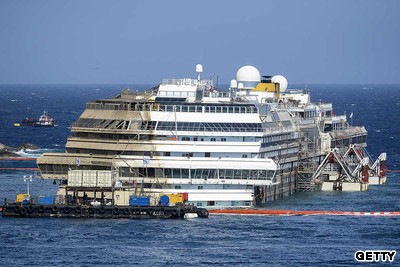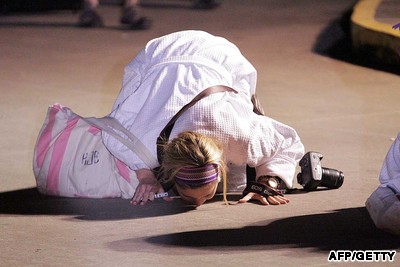Would you cruise after Concordia?
It was the event the cruise industry had been awaiting and dreading with equal measure.
Last Tuesday, the mangled wreck of Costa Concordia was finally raised after a 19-hour, $800 million salvage operation that put the stricken ship back in the news.
It’s been 18 months since the multimillion-dollar vessel hit rocks off the island of Giglio in Italy and was then steered by Captain Schettino toward land, where it keeled over, killing 32 people.
The accident occurred a few months before the 100th anniversary of the sinking of the Titanic, reminding the world that, while cruising is one of the safest forms of travel, disasters at sea still happen.
Wake-up call?
The tragedy might have been a wakeup call for the cruise industry, which, in some cases, had let safety drills become fun diversions that passengers took delight in missing. But has it heeded it?
Health scares, fires and collisions have kept cruising in the headlines ever since Concordia — a total of 97 mishaps in 2012 alone, according to CruiseJunkie.com.
A few weeks after Concordia, engine room fires caused emergencies on Costa Allegro and Azamara Club Cruises’ Azamara Quest.
 The “parbuckled” Concordia.In February this year, passengers on the newly christened “poop-cruise,” Carnival Triumph, were stranded at sea for five days without electricity and toilets after an engine room blaze.
The “parbuckled” Concordia.In February this year, passengers on the newly christened “poop-cruise,” Carnival Triumph, were stranded at sea for five days without electricity and toilets after an engine room blaze.
A month later, a cruise on Carnival Dream was cut short when an emergency generator malfunctioned.
A fire on Grandeur of the Seas knocked the ship out of action for several weeks.
Celebrity Millennium’s Alaska season was cancelled due to mechanical problems.
Industry under scrutiny
As Christine Duffy, president and chief executive officer of industry body the Cruise Lines International Association, admits, the Concordia disaster put cruising under “a harsher microscope” — and there has been little reason for the scrutiny to let up.
Despite all the troubles, however, cruising continues to grow.
Some 20,335,000 passengers worldwide took a cruise holiday in 2012, up 958,000 on the previous year
The bad news, for the cruise lines at least, is that many of these passengers weren’t the cruise rookies they need to fill their new big ships, but regular cruisers taking advantage of historically low fares.
More on CNN: What’s inside wrecked Concordia?
Concordia and subsequent disasters, in other words, may have lost a generation of cruise virgins to the industry, while the old hands cash in.
After the malfunctions aboard the ironically named Triumph, Carnival Cruise Lines was cutting fares in the United States to less than $50 a day to snare bookings.
In the UK, which has the second-largest number of cruisers after the United States, fares of £50 a day aren’t unheard of.
Those rates are for all accommodation, food (except meals in the speciality restaurants) and entertainment.
Cruise fares fall
A survey in the UK by online travel agency Bon Voyage found cruise fares were 22% lower now than five years ago.
That’s painful for the cruise lines.
During an earnings call at the end of June, Howard Frank, vice-chairman of Carnival Corp, which owns 10 cruise brands including Costa, Princess Cruises, Holland America Line and Cunard, said the Carnival Cruises brand was likely to lose about 50 cents per share as a result of lower revenue yields, lost sailings and repairs, investment programs and higher marketing spend.
For this story, CNN spoke with a random selection of passengers on Cunard’s Queen Elizabeth on the day of the Costa Concordia parbuckling (the nautical term for raising the ship).
All were past cruisers and said they never worried about cruising after the crash — although one seasoned cruiser, Jo Clough, had just returned from a trip with Princess Cruises, said it had made her think more about which company she travelled with.
Not everyone is so confident.
A May poll of 2,000 Americans conducted by New York-based Harris Interactive found almost two-thirds believe air travel is safer than cruising, after the spate of fires and power failures on cruise ships this year.
Half of those questioned agreed they were less likely to take a cruise now than a year ago, with those who had never cruised more wary than those who had (56% vs. 43%).
Cruise rookies
 Giving thanks after the stricken Carnival Triumph “poop cruise” finally arrived in port. It could be months before Costa Concordia is scrapped, and it will certainly be much longer before it’s forgotten.
Giving thanks after the stricken Carnival Triumph “poop cruise” finally arrived in port. It could be months before Costa Concordia is scrapped, and it will certainly be much longer before it’s forgotten.
But now the vessel is no longer on its side and there are signs the economy is picking up globally. Cruise lines are hoping cruise rookies will again be tempted to try a holiday at sea, especially as passengers have never had it so good when it comes to prices.
Cruise lines have always prided themselves on offering good value — “too good” at the moment, says Richard Fain, Royal Caribbean Cruises chairman.
More on CNN: How cruise ship tragedy transformed sleepy Italian island
The buyers’ market is set to continue for the foreseeable future as yet more ships launch, hungry for passengers.
This year, MSC Cruises, Hapag-Lloyd Cruises, Norwegian Cruise Line, Princess Cruises and Compagnie du Ponant brought new ships into service that between them had about 13,000 more berths.
Next year there will be new vessels from Norwegian, Princess, Royal Caribbean International and Costa Cruises — making more than 16,000 extra beds.
That’s roughly 500,000 more customers needed just to fill those four ships over a 12-month period.
Will the cruise lines get them?
Most likely.
Cruise lines are resilient. They’ve weathered fires, sinkings and one of the worst economic downturns on record, and still people are booking, lured by low fares, good value and incentives.
“We’re only just beginning,” says CLIA’s Christine Duffy. “Almost 21 million people worldwide will take a cruise holiday this year.
“There are incredible opportunities for growth.”
CLIA forecasts 30 million cruise passengers within the next 12 years.
Booked and hooked?
Jo Rzymowska, associate vice-president and general manager UK Ireland for Royal Caribbean International, Celebrity Cruises and Azamara Club Cruises, is equally positive.
“We have the highest satisfaction rates of any kind of holiday,” she says.
“Once people have booked, they’re hooked.”
It remains to be seen whether bargain fares will temp the vital next generation of cruisers, though — let alone allow the industry to ride through another Concordia-scale disaster.
Leave a Reply